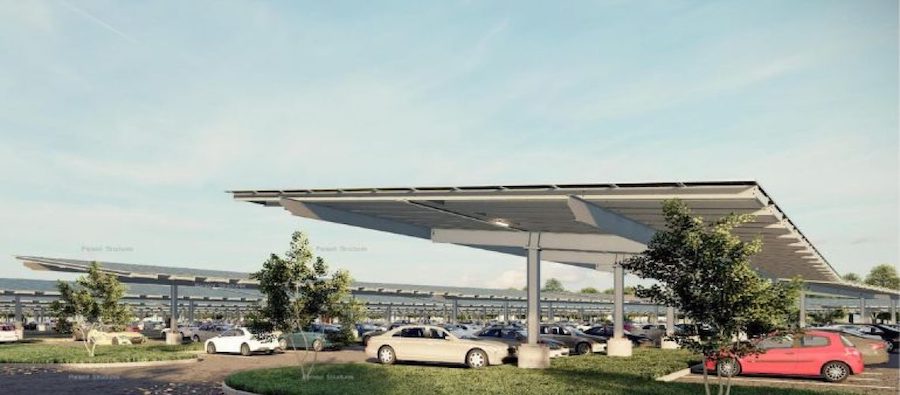Healthcare / Sustainability
Healthcare system to deliver solar energy canopy in major “milestone”
By Andrew Sansom | 22 Apr 2024 | 0
The University of Maryland Medical System (UMMS) has entered into a power purchase agreement (PPA) to design, install and maintain solar energy parking-lot canopies at three of its corporate locations.
The project, which includes two corporate office buildings in Linthicum, is expected to generate 27m kilowatt hours (kWh) of energy and generate more than $12 million in savings in electricity and parking-lot maintenance costs over a ten-year period.
The state of Maryland has established legislation requiring companies to find a 20-per-cent reduction in direct greenhouse gas emissions by 2030. With the implementation of this project and the health system’s previous adoption of no- and low-carbon renewable energy sources, UMMS will move to using 48 per cent renewable energy.
By harnessing power generated by solar energy, UMMS will generate carbon-free electricity, reduce its carbon footprint, and help mitigate the effects of climate change. The solar canopy project also contributes to energy resiliency and promotes renewable energy adoption. By providing an eco-friendly workplace environment, UMMS also expects to see further benefits from increased employee retention. 
“We’ve been very intentional in our ‘green’ efforts across the system, and this marks a significant milestone in our commitment to sustainability and environmental stewardship,” said Mohan Suntha, MD, president and chief executive of UMMS. “At the core of our mission as an anchor institution lies a profound commitment to foster a healthier environment for Maryland and beyond. Looking ahead, we plan to continue investing smartly in sustainable energy projects and exploring innovative ways to further reduce our carbon footprint.”
The solar canopy project is expected to break ground this autumn and energy production to begin in mid-2026. In addition to the two office buildings in Linthicum, the third canopy will be built at the health system’s data centre. UMMS is partnering with CI Renewables on the PPA, which includes design, land development, financing, construction, commissioning and operation of the solar canopy system. The project is also expected to generate more than 100 construction jobs.
“We’re delighted to be partnering with the University of Maryland Medical System,” said Luke Smith, vice-president of CI Renewables. “The benefits from their commitment to a more sustainable future will materialise in these solar projects and spill into the communities where UMMS operates.”
About 35 per cent of energy used by the health system is produced by no- or low-carbon technologies. UMMS operates a solar farm in Somerset County on the Eastern Shore that has been generating 2 per cent of UMMS power for ten years. It also maintains a hydroelectric arrangement that produces 25 per cent of power needed, and it runs on-site co-generation plants at the health system’s hospitals in Bel Air, Glen Burnie, Largo and Towson, which in total generate 8 per cent. In June, another solar farm will come online in Somerset County, and a fifth co-generation plant is expected to become operational in 2025, increasing the total to nearly 50 per cent.
Earth Day and waste management
Highlighting Earth Day (which falls today, 22 April), Richie Stever, vice-president of real estate and construction for UMMS, said UMMS is committed to “a number of sustainability initiatives across our facilities, which contribute to energy savings and promote a more sustainable energy portfolio”.
The health system has adopted various waste management strategies aimed at reducing its environmental impact, such as replacing paper towels with hand dryers and utilising washable linens and reusable items; implementing cardboard take-back programmes for suppliers; prioritising ‘green’ purchasing practices to reduce its environmental footprint by sourcing products with minimal packaging; increasing recycled content; and avoiding chemicals of concern.
UMMS has also made some major strides in energy efficiency by diversifying its energy sources through investments in renewable energy projects, such as energy-efficient equipment upgrades; energy treasure hunts; installing variable frequency drives to optimise energy consumption; implementing heat recovery systems; LED lighting upgrades; and installing occupancy sensors for lights in all newly constructed facilities. Water conservation is another key area for UMMS, which has implemented rainwater harvesting systems and water bottle-filling stations to conserve water and reduce landfill use across its facilities.
Patients and visitors at UMMS hospitals will notice sustainability initiatives through visible changes in infrastructure and operations, such as energy-efficient lighting, recycling programmes, and water conservation measures. The system has integrated sustainability into patient care by using eco-friendly materials and products, and ensuring no fragrances are used in patient care areas.
Organisations involved
